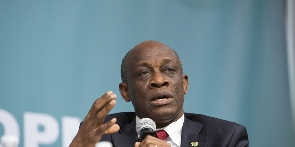- Home - News
- TWI News | TV
- Polls
- Year In Review
- News Archive
- Crime & Punishment
- Politics
- Regional
- Editorial
- Health
- Ghanaians Abroad
- Tabloid
- Africa
- Religion
- Election 2020
- Coronavirus
- News Videos | TV
- Photo Archives
- News Headlines
- Press Release
Business News of Thursday, 30 April 2015
Source: B&FT
Chamber of Commerce counts on Exim Bank for SME revival
The First Vice President of the Ghana Chamber of Commerce and Industry (GCCI), Dr. Prosper Adabla, has disclosed the Export-Import Bank that government plans to set up could just be the solution the private sector has been longing for, given the current economic situation.
Speaking to the B&FT on the sidelines of an event that saw the induction of 25 outstanding entrepreneurs into an Entrepreneurs Hall of Fame in Accra, he said establishing the bank will empower and reposition SMEs to make them contribute meaningfully to economic transformation.
“The Exim Bank has huge prospects in terms of sustaining the private sector’s productivity through strengthening small and medium enterprises in the country.
“The presence of such a bank could just be the solution that the private sector, especially small businesses, has been waiting for; I’m hundred percent sure that it will bring a change to the current situation facing the sector,” he said.
Dr. Adabla said small and medium businesses in the country are being held back by a myriad of factors, including continual limitation to accessing operating funds, thereby stifling their potential to meaningfully cushion economic growth, and that the Exim Bank will help to reverse the trend.
“The bank will give loans to small businesses at cheaper rates to invest in the much-needed capacity building and expansion projects, to make them more productive and contribute significantly to economic transformation.”
Finance Minister Seth Terkper, in his 2015 Budget presentation, announced government’s plan to set up Ghana Export-Import Bank to cushion its strategy of positioning the country as an export-led economy and also serve as a fulcrum on which to transform the economy.
The SME sector, which represents more than 90 percent of all businesses in the country, is currently bearing the brunt of an economy that has been weakened by erratic power supply, rising inflation and a depreciating cedi on the back of existing challenges such as low access to capital lack of skilled labour.
But the situation, according to Dr. Adabla, is difficult and tough but not ‘hopeless’: “The economic situation now, for instance the depreciating cedi, should encourage Ghanaians to produce more and export.
“Also, interest rates won’t come down because government keeps borrowing; we must be able to convince government it should reduce borrowing and empower home-grown companies to grow the economy.
“The business terrain is difficult and tough; but we are hoping that the problem will be reversed,” he said.











